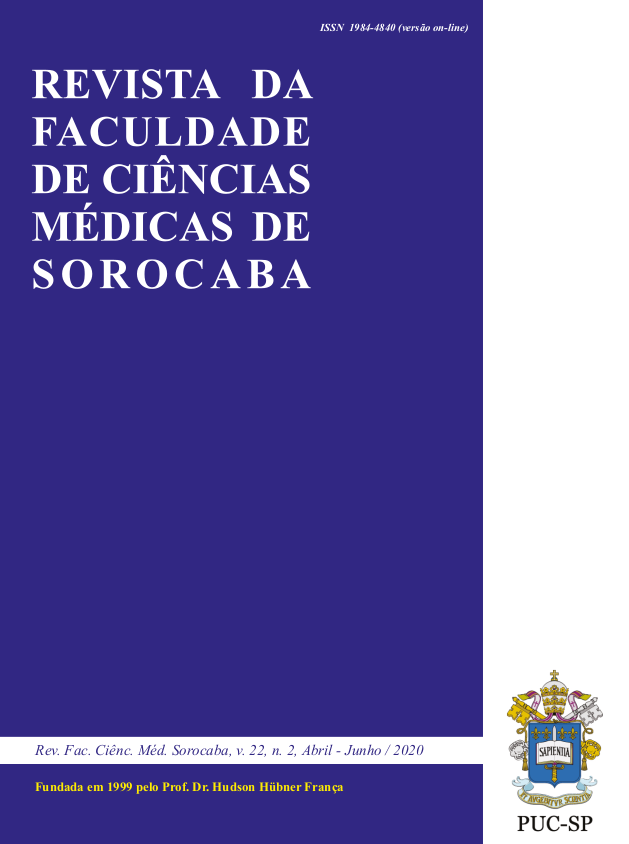Students perception about use of active methodologies in the discipline of Social Sciences and Health
DOI:
https://doi.org/10.23925/1984-4840.2020v22i2a11Keywords:
problem-based learning, education, medical, medical students, perception.Abstract
Introduction: In the discipline of Social Sciences and Health (SSH), the use of active methods would have an importante contribution to the learning of students attending the fourth semester of the Universidade Estadual do Ceará Medicine course. Objective: Thus, aiming to quantify students’ perceptions about the effectiveness of the use of these tools, a quantitative study was developed. Methods: For this, the semi-structured questionnaire was applied, through the Google Drive platform, to students who participated in the course in 2018, covering aspects related to the teaching-earning process. Results: From the obtained results, the active methodologies were observed to promote the strengthening of the learning process and contribute positively to the teacher-student relationship. In this context, the inclusion of active methodologies seems to positively contribute the medical education, given its versatility and dynamism. In the discipline of SSH, some tools are used, such as the cases discussion and role play, in order to facilitate the sedimentation of theoretical contents. Knowing the students’ perception of the use of these methodologies is crucial since they are directly affected by the introduction of them in the discipline of SSH. At the same time, this allows them to evaluate their effectiveness in the conduction ...
References
Roman C, Ellwanger J, Becker GC, Silveira AD, Machado CLB, Manfroi WC. Metodologias ativas de ensino-aprendizagem no processo de ensino em saúde no Brasil: uma revisão narrativa. Clin Biomed Res. 2017;37(4):349-57. https://doi.org/10.4322/2357-9730.73911
Rabelo L, Garcia VL. Role-Play para o desenvolvimento de habilidades de comunicação e relacionais. Rev Bras Educ Méd. 2015;39(4):586-96. https://doi.org/10.1590/1981-52712015v39n4e01052014
Mesquita SKC, Meneses RMV, Ramos DKR. Metodologias ativas de ensino/aprendizagem: dificuldades de docentes de um curso de enfermagem. Trab Educ Saúde. 2016;14(2):473-86. https://doi.org/10.1590/1981-7746-sip00114
Marin MJS, Gomes R, Marvulo MML, Primo EM, Barbosa PMK, Druzian S. Pós-graduação multiprofissional em saúde: resultados de experiências utilizando metodologias ativas. Interface (Botucatu). 2010;14(33):331-44. https://doi.org/10.1590/S1414-32832010000200008
Silva SL, Silva SFR, Santana GSM, Nuto SAS, Machado MFAS, Diniz RCM, et al. Estratégia educacional baseada em problemas para grandes grupos: relato de experiência. Rev Bras Educ Méd. 2015;39(4):607-13. https://doi.org/10.1590/1981-52712015v39n4e02312013.
Pedrosa IL, Lira GA, Oliveira B, Silva MSML, Santos MB, Silva EA, et al. Uso de metodologias ativas na formação técnica do agente comunitário de saúde. Trab Educ Saúde. 2011;9(2):319-32. https://doi.org/10.1590/S1981-77462011000200009
Freitas CM, Freitas CASL, Parente JRF, Vasconcelos MIO, Lima GK, Mesquita KO, et al. Uso de metodologias ativas de aprendizagem para a educação na saúde: análise da produção científica. Trab Educ Saúde. 2015;13(supl 2):117-30. https://doi.org/10.1590/1981-7746-sip00081
Downloads
Published
How to Cite
License
Copyright (c) 2021 Revista da Faculdade de Ciências Médicas de Sorocaba

This work is licensed under a Creative Commons Attribution-NonCommercial 4.0 International License.
Os autores no momento da submissão transferem os direitos autorais, assim, os manuscritos publicados passam a ser propriedade da revista.
O conteúdo do periódico está licenciado sob uma Licença Creative Commons 4.0, esta licença permite o livre acesso imediato ao trabalho e que qualquer usuário leia, baixe, copie, distribua, imprima, pesquise ou vincule aos textos completos dos artigos, rastreando-os para indexação, passá-los como dados para o software, ou usá-los para qualquer outra finalidade legal.

 Este obra está licenciada com uma Licença
Este obra está licenciada com uma Licença 